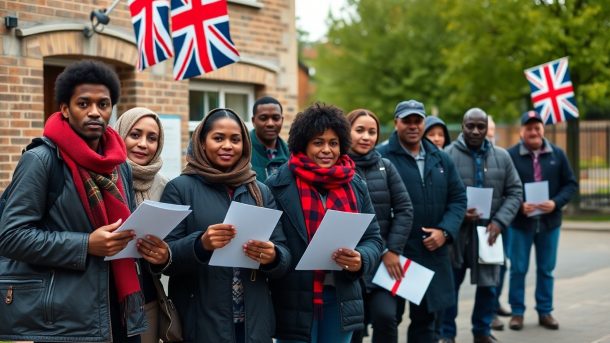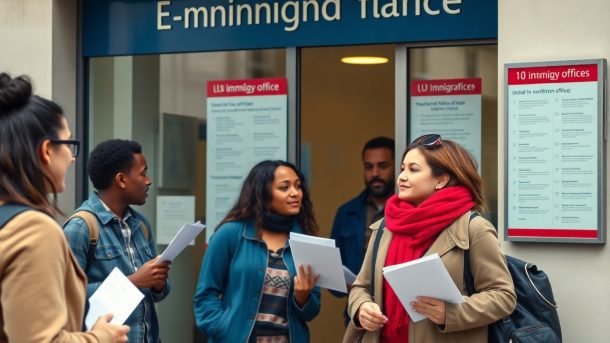Most individuals seeking a better life in the UK have questions about their legal rights and protections. Understanding your rights is vital for navigating daily life, accessing services, and integrating into your new community. This blog post will guide you through the various legal rights available to migrants in the UK, including employment rights, access to healthcare, and protection from discrimination, ensuring you are well-informed as you launch on your journey.
Key Takeaways:
- Right to Seek Asylum: Migrants have the legal right to apply for asylum in the UK if they are fleeing persecution or danger in their home country.
- Access to Legal Representation: Migrants are entitled to free legal representation in certain circumstances, ensuring they can navigate the legal system effectively.
- Protection from Discrimination: Legislation in the UK provides protections against discrimination based on nationality, ethnicity, or immigration status.
Overview of Migration Laws in the UK
The UK has a complex framework of migration laws that regulate how individuals from outside the country can enter, stay, or settle. These laws encompass various categories of visas, asylum processes, and immigrant rights. Understanding these laws is necessary for anyone navigating the UK immigration system, as they dictate your legal status and rights while living in the country.
Types of Visa Immigration
The UK immigration system offers several types of visas for migrants, depending on their circumstances and intentions. Here’s a breakdown of some common visa categories:
- Work Visas
- Student Visas
- Family Visas
- Visitor Visas
- Settlement Visas
After selecting a visa type, you will need to meet specific requirements to apply successfully.
| Visa Type | Description |
| Work Visa | For employment in the UK |
| Student Visa | For pursuing education in the UK |
| Family Visa | For joining family members in the UK |
| Visitor Visa | For tourism or short stays |
| Settlement Visa | For permanent residence in the UK |
Asylum Seekers and Refugees
To seek asylum in the UK, you must demonstrate that you cannot return to your home country due to a well-founded fear of persecution. This is a critical process, as it grants protection and potentially leads to refugee status, which comes with specific rights and entitlements.
For instance, if you apply for asylum, you may be eligible for support services while your case is being processed. This could include accommodation and financial assistance. Additionally, if granted refugee status, you enjoy similar rights to those granted to UK citizens, such as access to healthcare and the ability to work. It is important to navigate this process carefully and seek legal advice if you face difficulties or uncertainties. Your rights as an asylum seeker or refugee can significantly impact your life in the UK.

Rights to Work and Employment
Assuming you are a migrant in the UK, you have the right to seek employment and work under specific legal frameworks. It is important to understand your rights, as outlined in various resources, including those available at KNOW YOUR RIGHTS. This knowledge empowers you to navigate potential challenges in the job market and ensures that your entitlements are fully protected.
Legal Employment Status
Beside understanding your right to work, you must also verify your legal employment status. This entails ensuring that you have the appropriate visa or residency status that permits you to work in the UK. Your legal status is critical to securing a job and protects you from exploitation by employers.
Rights to Fair Treatment in the Workplace
Along with your right to work, you are entitled to fair treatment in the workplace. This encompasses non-discrimination based on race, ethnicity, gender, or immigration status. Employers are legally obligated to provide a safe and respectful environment, allowing you to perform your duties without facing harassment or inequality.
Hence, understanding your rights to fair treatment is vital for your well-being in the workplace. You should be aware that if you encounter any discriminatory practices or unfair treatment, you have the right to take action. You can report such incidents to the appropriate authorities, and it is advisable to consult resources that guide you through the process of addressing workplace grievances effectively. Your rights should be upheld, ensuring you work in an environment that values diversity and inclusion.

Access to Healthcare and Education
Keep in mind that your access to important services like healthcare and education may vary based on your residency status. The Illegal Migration Act 2023 introduces new restrictions that could affect your rights, so it’s important to stay informed about your legal standing.
NHS Services for Migrants
An important aspect of your rights as a migrant is accessing NHS services, which generally provide free healthcare to residents. However, if you’re not a settled migrant, you may face charges for certain services. To understand your specific rights better, it’s recommended to check the NHS guidelines and your residency status.
Educational Rights for Children of Migrants
Below the age of 18, children of migrants are entitled to free education in the UK, regardless of their immigration status. This means that your child can enroll in state schools and access the education system, which is vital for their development and future prospects.
Further, it’s important to know that schools cannot deny admission based on your immigration status, as every child has a right to education under UK law. Local authorities are obligated to support these rights, ensuring your child receives the education they deserve. Stay engaged with your local education authority to understand any additional support services available to you.
Social Security and Welfare Benefits
After arriving in the UK, understanding the social security and welfare benefits available to you is vital. Migrants may qualify for various forms of assistance, including housing support, income benefits, and child benefits, depending on their residency status and contributions to the UK’s National Insurance system.
Eligibility Criteria
For you to access social security and welfare benefits in the UK, specific eligibility criteria must be met. This often includes your residency status, whether you have the right to reside in the UK, and your duration of living in the country. Additionally, you might need to provide proof of income and National Insurance contributions.
Available Support Services
Security in your living situation can be enhanced by utilizing the various support services available to you. The UK has organizations that assist migrants in navigating the complexities of the welfare system, guiding you to access the benefits you may be entitled to.
Benefits you may find through these support services include housing assistance, healthcare guidance, and access to legal resources. These services aim to empower you by offering information and tools that help you navigate the welfare system effectively, ensuring you receive the support necessary for a stable life in the UK.
Legal Protections Against Discrimination
Despite the challenges you may face, the UK offers important legal protections against discrimination. Various laws safeguard your rights as a migrant, ensuring that you receive fair treatment in multiple areas, including employment, housing, and public services. These protections aim to create a just environment where everyone can thrive, regardless of their nationality or immigration status.
Anti-Discrimination Laws
Before navigating your rights, it’s imperative to understand that UK anti-discrimination laws prohibit unfair treatment based on characteristics such as race, nationality, and ethnicity. The Equality Act 2010 is a key piece of legislation that extends protections to you, helping to combat any form of discrimination you may encounter in different aspects of life, including workplaces and schools.
Reporting and Recourse Options
About your rights, if you experience discrimination, various reporting and recourse options are available to you. Knowing how to take action can empower you to address any unjust treatment effectively.
Due to the various avenues available, you can report discrimination directly to organizations such as the Equality Advisory and Support Service (EASS) or your local Citizens Advice Bureau. Additionally, if your situation involves workplace issues, the Advisory, Conciliation and Arbitration Service (ACAS) provides resources and guidance. In some cases, taking legal action may be an option, allowing you to assert your rights formally. By being aware of these channels, you can take proactive steps in addressing discrimination and protecting your rights.
The Role of NGOs and Legal Aid
Once again, the importance of NGOs and legal aid organizations cannot be overstated when it comes to supporting migrants in the UK. These entities provide vital services that help individuals navigate the legal landscape, ensuring that your rights are upheld and that you have access to necessary resources. By offering guidance, advocacy, and representation, they play a pivotal role in defending your interests and improving your situation.
Support Services Offered
NGOs provide a wide range of support services that cater specifically to your needs as a migrant. These services may include legal advice, representation in court, emotional support, and assistance with practical issues such as housing or healthcare. By connecting you with experienced professionals, NGOs aim to empower you and ensure that your voice is heard throughout the legal process.
How to Access Legal Assistance
Below are several steps you can take to access legal assistance easily. You can reach out to local NGOs, legal aid clinics, or community organizations dedicated to migrant support. Many of these organizations offer free or low-cost services, making it feasible for you to get the help you need without fear of financial strain.
Due to the abundance of resources available, it’s vital for you to take the first step by researching organizations in your area. You can usually find contact information online or through community centers. Don’t hesitate to call or visit, as many NGOs welcome walk-ins and offer initial consultations to assess your situation. With a proactive approach, you can effectively access the legal assistance required to protect your rights.
To wrap up
Hence, understanding your legal rights as a migrant in the UK is important for navigating your new environment effectively. As a migrant, you are entitled to various protections, including access to healthcare, education, and opportunities for employment, subject to your immigration status. It is important to familiarize yourself with relevant legislation and seek legal advice if you encounter difficulties. By knowing your rights, you empower yourself to advocate for your needs and ensure you can build a fulfilling life in the UK.
FAQ
Q: What legal rights do migrants have in the UK?
A: Migrants in the UK have a variety of legal rights, including the right to seek asylum, the right to work, access to healthcare, and the right to challenge decisions made by immigration authorities. These rights can depend on the migrant’s specific status, such as whether they are seeking asylum, have limited leave to remain, or are considered irregular migrants.
Q: Can migrants access healthcare services in the UK?
A: Yes, migrants can access healthcare services in the UK, though the extent of access may vary based on their immigration status. Individuals who have been granted asylum or refugee status can access the National Health Service (NHS) without charge. However, some migrants, particularly those with irregular status, may face restrictions and could be charged for certain services.
Q: What rights do asylum seekers have in the UK?
A: Asylum seekers in the UK have specific legal rights, including the right to remain in the country while their application is being processed. They are entitled to work after waiting for 12 months for a decision, and they have the right to appeal if their application is refused. Additionally, asylum seekers receive support in the form of accommodation and subsistence payments, subject to certain conditions.
Q: Are there any legal protections against exploitation for migrant workers?
A: Yes, migrant workers in the UK are protected by several laws against exploitation, including the Employment Rights Act, which ensures fair treatment in the workplace. This includes rights regarding minimum wage, working hours, and safe working conditions. Migrant workers who believe they are being exploited can report their situation to the relevant authorities or seek assistance from various worker rights organizations.
Q: How can migrants appeal immigration decisions in the UK?
A: Migrants in the UK have the right to appeal certain immigration decisions, such as visa refusals or deportations. The appeal process typically involves submitting a Notice of Appeal to the First-tier Tribunal within a specified timeframe. Migrants may access legal assistance to help them navigate this process and present their case effectively in front of an immigration judge.













Recent Comments